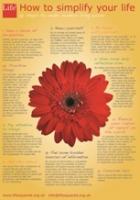1. Keep a sense of perspective – within all the madness of daily life remind yourself that, when it comes down to it, you’re just a creature living as part of the natural world - and that all the human-made complexity around you (including buildings, work and advertising) is just garnish and ultimately inconsequential.
2. Know yourself – try to develop an honest sense of what you are really about, including what makes you happy and fulfilled, what makes you unhappy or uncomfortable, what your priorities are in life and how you really want to live. Don’t judge yourself on your choices – just be honest.
3. Be happy with yourself – learn to be happy with yourself - or at least accept who you are and the choices you make. Don’t feel you need to follow the herd – you don’t have to rush, seek the big career, buy the latest gadgets or anything else – just live the way you want.
4. Have some daily reflection time - no matter how busy your life is, you can afford to give yourself at least ten minutes each day to sit quietly without disturbance, close your eyes, relax and remove yourself from the rush. This will really help to calm you and make life clearer. Activities such as meditation, yoga or walking in the countryside can help this process, but choose the way that suits you best.
5. Reduce your radius of impact on the world - in general, the simpler and more local you can make your life, the smaller your radius of impact is likely to be and therefore the less complexity you will find. For example, buying your food locally and buying local produce where possible will reduce the range of processes, transactions and people involved in supplying your food.
6. Consume less – this is one of the most effective ways of reducing your radius of impact.
7. Find some trusted sources of information - no source of information is completely unbiased, but it is possible to build a selection of trusted sources that can summarise and filter some of the complexity in the world for you. By finding these sources and understanding their biases, you can build a useful resource to help you deal with the complexity of the world on an ongoing basis. These may include newspapers, websites and other information resources.
8. Get into nature - get away from the complexity of modern life and get into the countryside. Spending some time walking or simply sitting in nature can give us a sense of calm and perspective, and therefore contributes to our well-being.
9. Pay attention to things – start to appreciate your experiences more – including simple things like having a cup of tea or walking down the street on a crisp, clear day. As you begin to savour the simple things in life again you may find you have less time and inclination to bother yourself with all the complexities of modern life.
10. Prioritise things – it’s your life – so ask yourself what really matters to you. The idea that ‘you can do everything’ is a harmful modern myth. You are only able to process a finite amount of information and do a finite number of things in life, so make sure you choose the things that you care about, and try not to worry about the vast number of other possibilities in the world.
Life Squared 2012





